Union members in Southern California are proving that good jobs and sustainable environmental practices go hand in hand. The members of IBEW Local 569 in San Diego are working alongside the environmental community to create work that sustains communities and keeps union members working. –TheElectricalWorker on YouTube.
View this complete post...Posts Tagged ‘Solar Energy’
San Diego, CA: IBEW Goes for the Green
Friday, May 10th, 2013U.S.Solar Market Insight Report Q2 2012
Tuesday, September 11th, 2012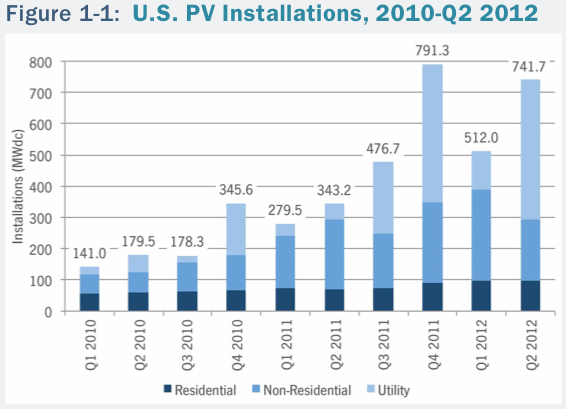
SOLAR ENERGY INDUSTRIES ASSOCIATION & GTM RESEARCH
The U.S. market remains a rare bright spot in a difficult global solar environment this year. Although global installations should grow overall (GTM Research forecasts 18% global growth in 2012), manufacturer margins remain severely compressed as a result of persistent overcapacity.
Empowering LA’s Solar Workforce: New Policies that Deliver Investments and Jobs
Monday, November 21st, 2011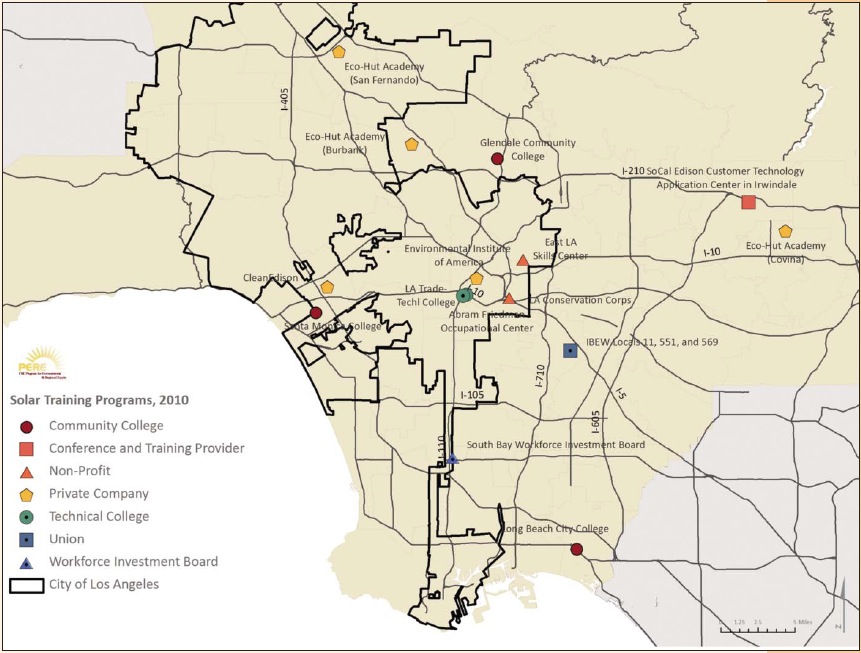
LABC INSTITUTE
Los Angeles is home to year-round sunshine and an entrepreneurial spirit. As such, it has the potential to be the national leader in solar power and clean energy jobs. Further, thanks to an abundance of training programs, Los Angeles boasts a trained workforce ready for jobs in solar installation, design, sales and more. Unfortunately, the Los Angeles Department of Water and Power (LA DWP) has failed to take advantage of the tremendous environmental and economic potential that solar power offers our region. As a result, Los Angeles has unwittingly forfeited significant opportunities to take leadership in this growing industry, meet the renewable energy goals mandated by state law, and create thousands of local jobs.
Solar Energy: Economic Impact of Extending the Section 1603 Treasury Program
Friday, October 21st, 2011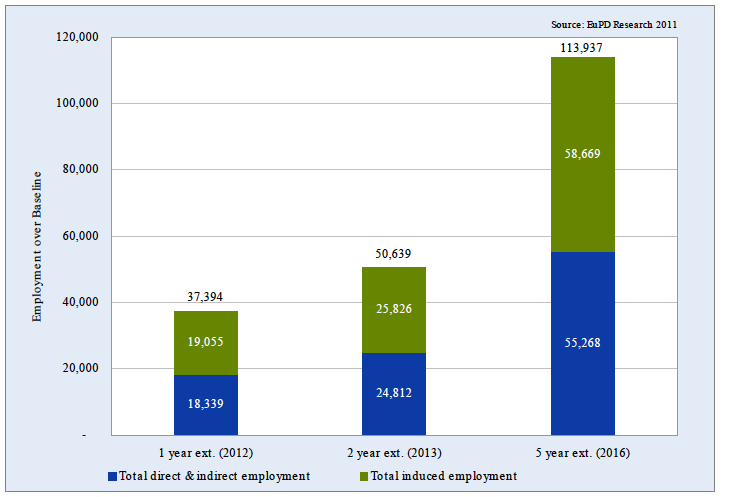
SOLAR ENERGY INDUSTRIES ASSOCIATION
The U.S. solar market has experienced rapid growth in the last few years and is poised to continue growing over the next five years according to our baseline forecast. However, extending the TGP would significantly accelerate this growth, increasing investment, employment and deployment across the U.S. While an extension would benefit all sectors of the solar industry, utility-scale solar development would see some of the longest lasting impacts due to the long project development process.
The Impact of Clean Energy Innovation: Examining the Impact of Clean Energy Innovation on the United States Energy System and Economy
Wednesday, June 29th, 2011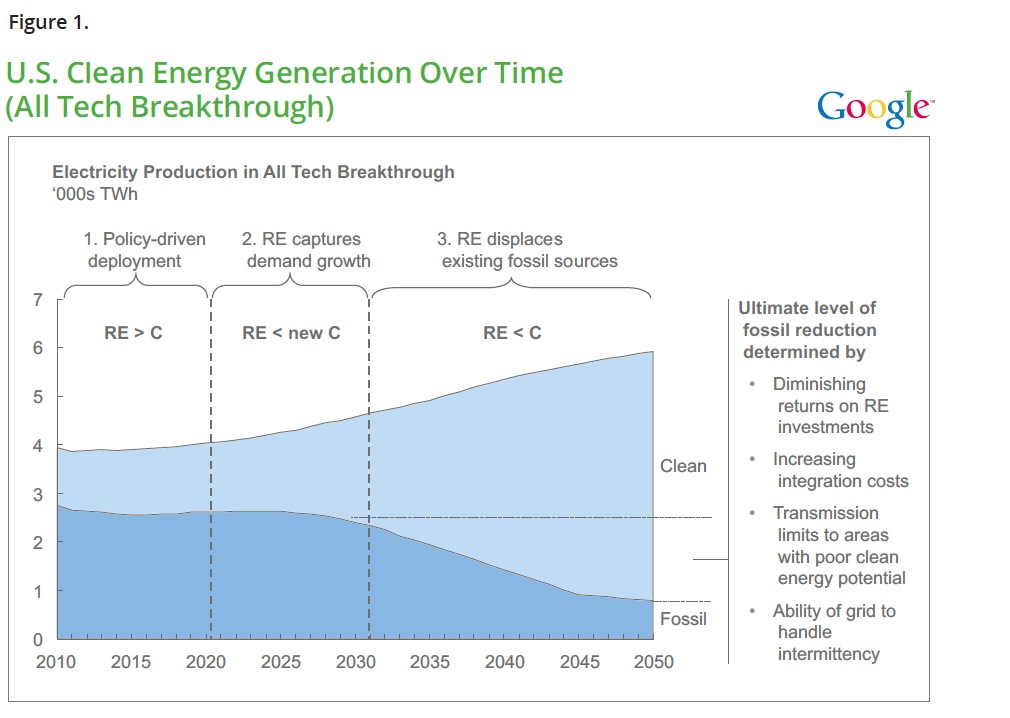
GOOGLE.ORG
Our need for energy must be balanced against the often competing interests of the economy, environment, and national security. Clean, sustainable, safe, and secure sources of energy are needed to avoid long-term harm from geopolitical risks and global climate change. Unless fully cost-competitive with fossil fuels, the adoption of clean technologies will either be limited or driven by policy. Innovation in clean energy technology is thus needed to reduce costs and maximize adoption. But how far can energy innovation go towards meeting economic, environmental, and security needs? This analysis attempts to estimate the potential impact clean energy innovation could have on the US economy and energy landscape.
U.S. Solar Market Insight: 1st Quarter 2011
Tuesday, June 21st, 2011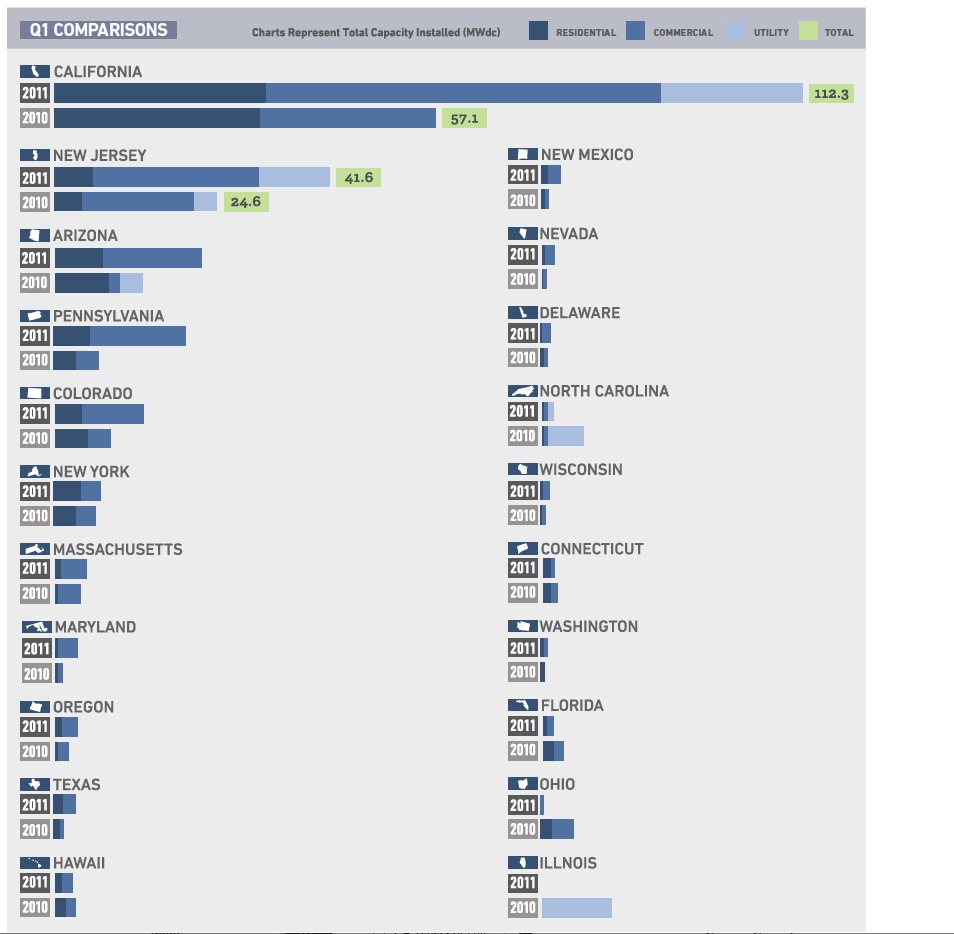
SOLAR ENERGY INDUSTRIES ASSOCIATION
For concentrating solar, which includes both concentrating solar power (CSP) and concentrating photovoltaics (CPV), the U.S. is poised to become the global market leader in installations. After 20 years of near-dormancy in the industry, many large-scale concentrating solar projects are set to continue their expected ramp-up over the next few years including the expected completion of the world’s largest CPV facility (at 30 MW) expected before December.
2010 SEPA Utility Solar Rankings
Wednesday, June 15th, 2011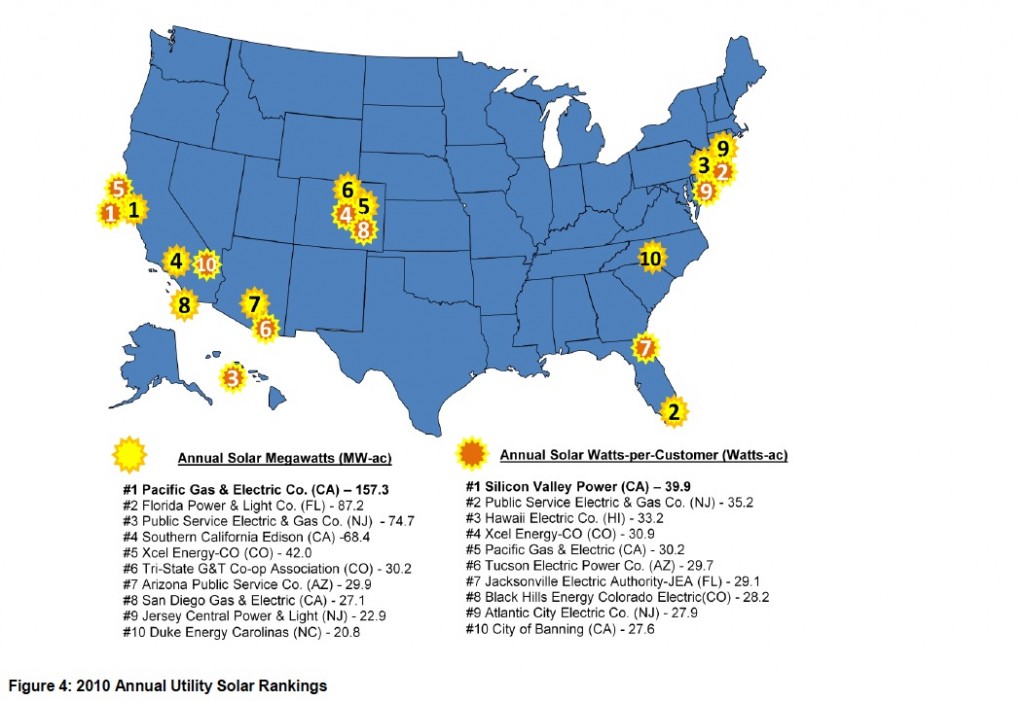
SOLAR ELECTRIC POWER ASSOCIATION
In addition to continued growth, the new report shows two dramatic changes taking place in utilities‘ use of solar power. 1) The report demonstrates that more and more growth came from areas outside the traditionally strong solar regions of California and the Southwest. Many utilities in other parts of the country now have sizeable solar portfolios, and tens of thousands of photovoltaic (PV) systems were installed in nationwide. 2) With a growing trend toward more utility-owned solar projects and third-party power purchase agreements (PPA), the industry is no longer based solely on customer-owned, net-metered systems.
The High Cost of Nuclear Power: Why America Should Choose a Clean Energy Future Over New Nuclear Reactors
Wednesday, April 6th, 2011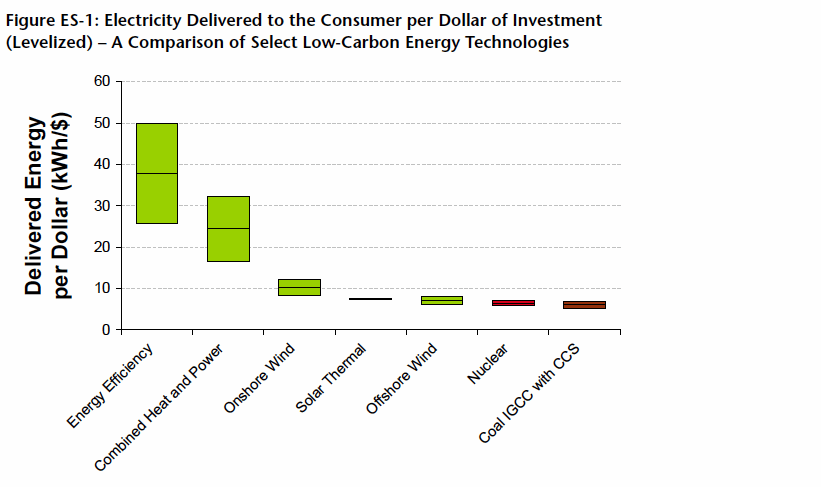
U.S. PIRG
Nuclear power is among the most costly approaches to solving America’s energy problems. Per dollar of investment, clean energy solutions – such as energy efficiency and renewable resources – deliver far more energy than nuclear power. This fact has important implications for America’s energy policy. By directing resources toward the most cost-effective solutions, we can make greater progress toward a secure, reliable and safe supply of electricity to power America’s economy.
Shining Bright: Growing Solar Jobs in Iowa
Tuesday, March 15th, 2011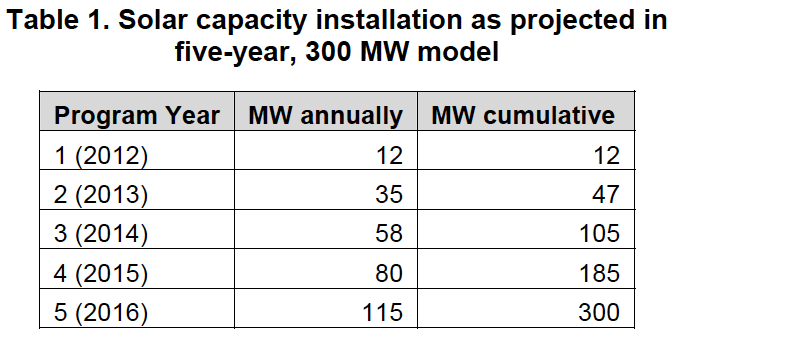
THE IOWA POLICY PROJECT
Can solar energy help build the Iowa economy? This analysis answers that question with a resounding “Yes.” Iowa has almost all the right ingredients on hand: demonstrated ability to be a renewable energy leader with wind power, a solar energy industry that already employs people across the state, and more sunshine than New Jersey or Germany, both leading global solar markets.
Energy 101: Solar PV
Friday, March 4th, 2011Solar photovoltaic (PV) systems can generate clean, cost-effective power anywhere the sun shines. This video shows how a PV panel converts the energy of the sun into renewable electricity to power homes and businesses.
-USdepartmentofenergy on YouTube
Follow InfrastructureUSA
CATEGORIES
- Accountability (219)
- Aging Infrastructure (755)
- Aviation (130)
- Biking (323)
- Bipartisan (271)
- Bridges (493)
- Broadband (57)
- Buses (160)
- Carbon Tax (22)
- Clean Air (182)
- Climate Change (200)
- Competitiveness (230)
- Congestion (327)
- Dams (77)
- Democrat (123)
- Drinking Water (191)
- Economic Stimulus (276)
- Employment (207)
- Energy (585)
- Environment (615)
- Equity (239)
- Funding (888)
- Global (205)
- Great American Infrastructure (33)
- Green (294)
- Guests on The Infra Blog (281)
- Hazardous Waste (27)
- High Speed Rail (224)
- Highway (785)
- Inland Waterways (204)
- Jobs (251)
- Land Use (98)
- LEED (28)
- Levees (42)
- Local (1,910)
- National (1,526)
- Policy (1,121)
- Pollution (215)
- Private Investment (213)
- Public Opinion (189)
- Public Parks & Recreation (197)
- Public Transportation (1,028)
- Racism (6)
- Rail (503)
- Recession (65)
- Recovery (218)
- Republican (109)
- Roads (1,120)
- Schools (80)
- Seaports (68)
- Smart Grid (98)
- Smart Growth (442)
- Solid Waste (26)
- Sustainability (765)
- Tax (112)
- Technology (397)
- Telecommunications (46)
- Transit (1,333)
- Urban Planning (981)
- Wastewater (181)
- Water Treatment (166)
Video, stills and tales. Share images of the Infra in your community that demands attention. Post your ideas about national Infra issues. Go ahead. Show Us Your Infra! Upload and instantly share your message.
Is the administration moving fast enough on Infra issues? Are Americans prepared to pay more taxes for repairs? Should job creation be the guiding determination? Vote now!
What do the experts think? This is where the nation's public policy organizations, trade associations and think tanks weigh in with analysis on Infra issues. Tell them what you think. Ask questions. Share a different view.
The Infra Blog offers cutting edge perspective on a broad spectrum of Infra topics. Frequent updates and provocative posts highlight hot button topics -- essential ingredients of a national Infra dialogue.
Dear Friends,
It is encouraging to finally see clear signs of federal action to support a comprehensive US infrastructure investment plan.
Now more than ever, our advocacy is needed to keep stakeholders informed and connected, and to hold politicians to their promises to finally fix our nation’s ailing infrastructure.
We have already engaged nearly 280,000 users, and hoping to add many more as interest continues to grow.
We require your support in order to rise to this occasion, to make the most of this opportunity. Please consider making a tax-deductible donation to InfrastructureUSA.org.
Steve Anderson
Managing Director
SteveAnderson@InfrastructureUSA.org
917-940-7125













 RSS Feed
RSS Feed